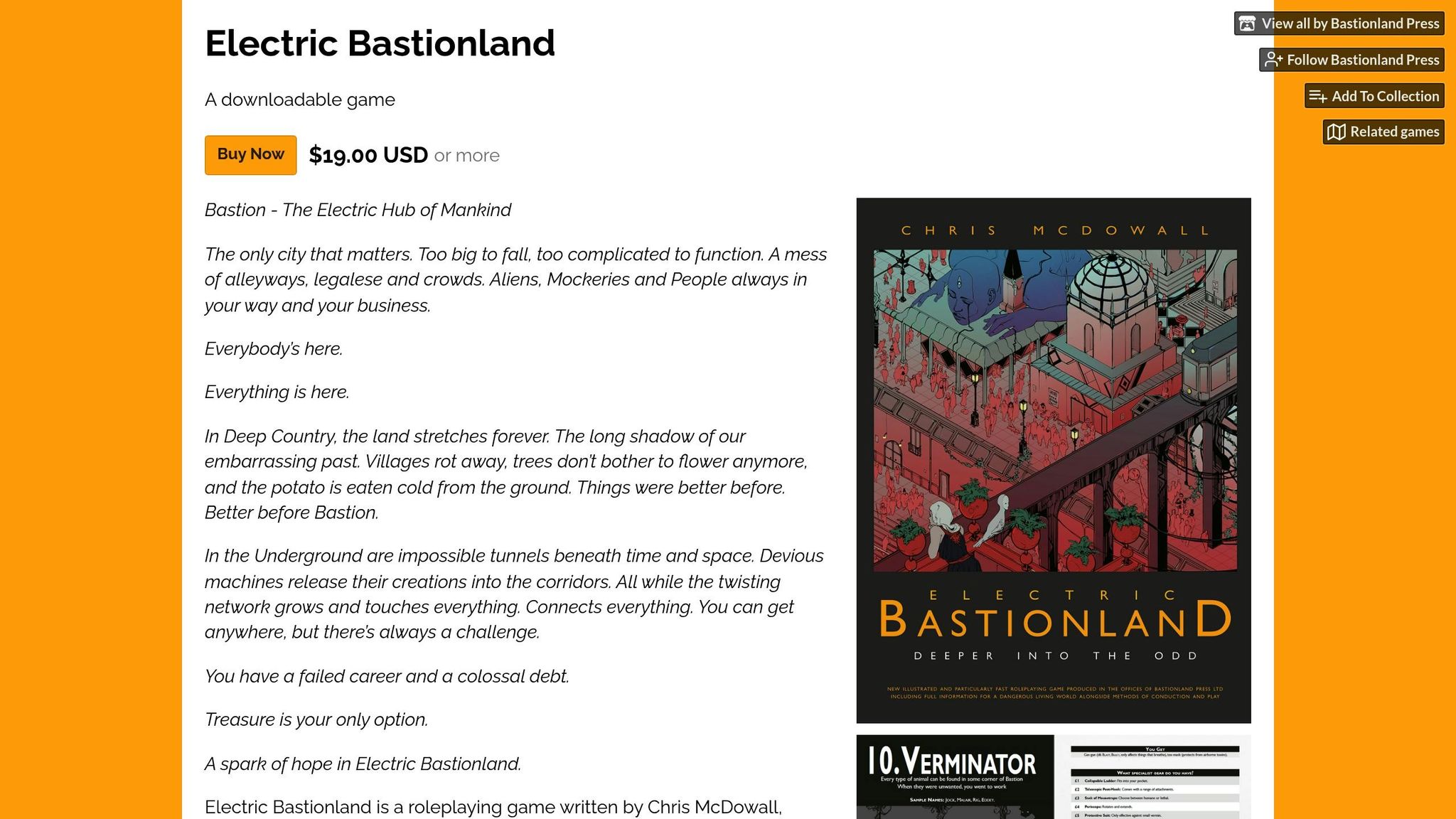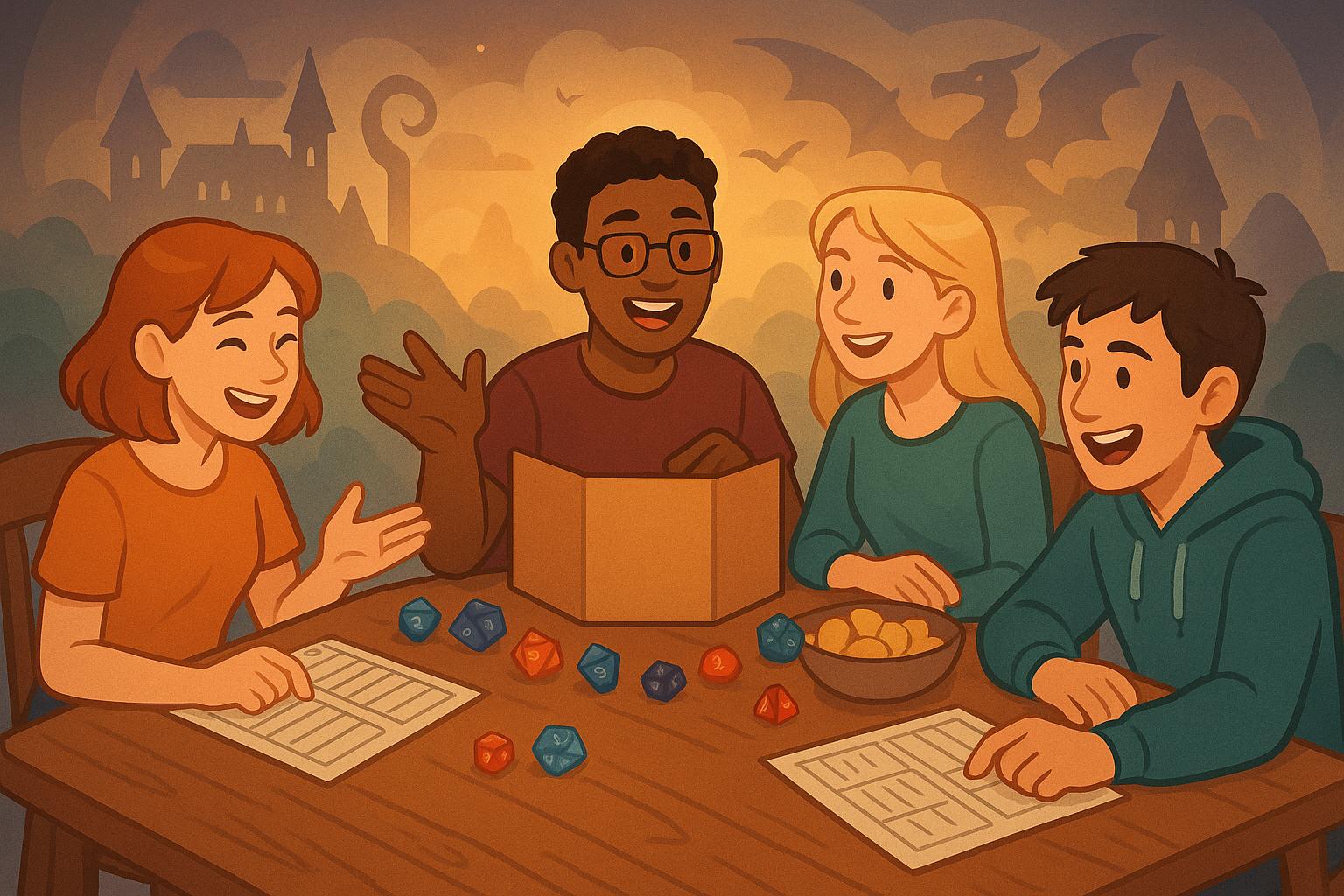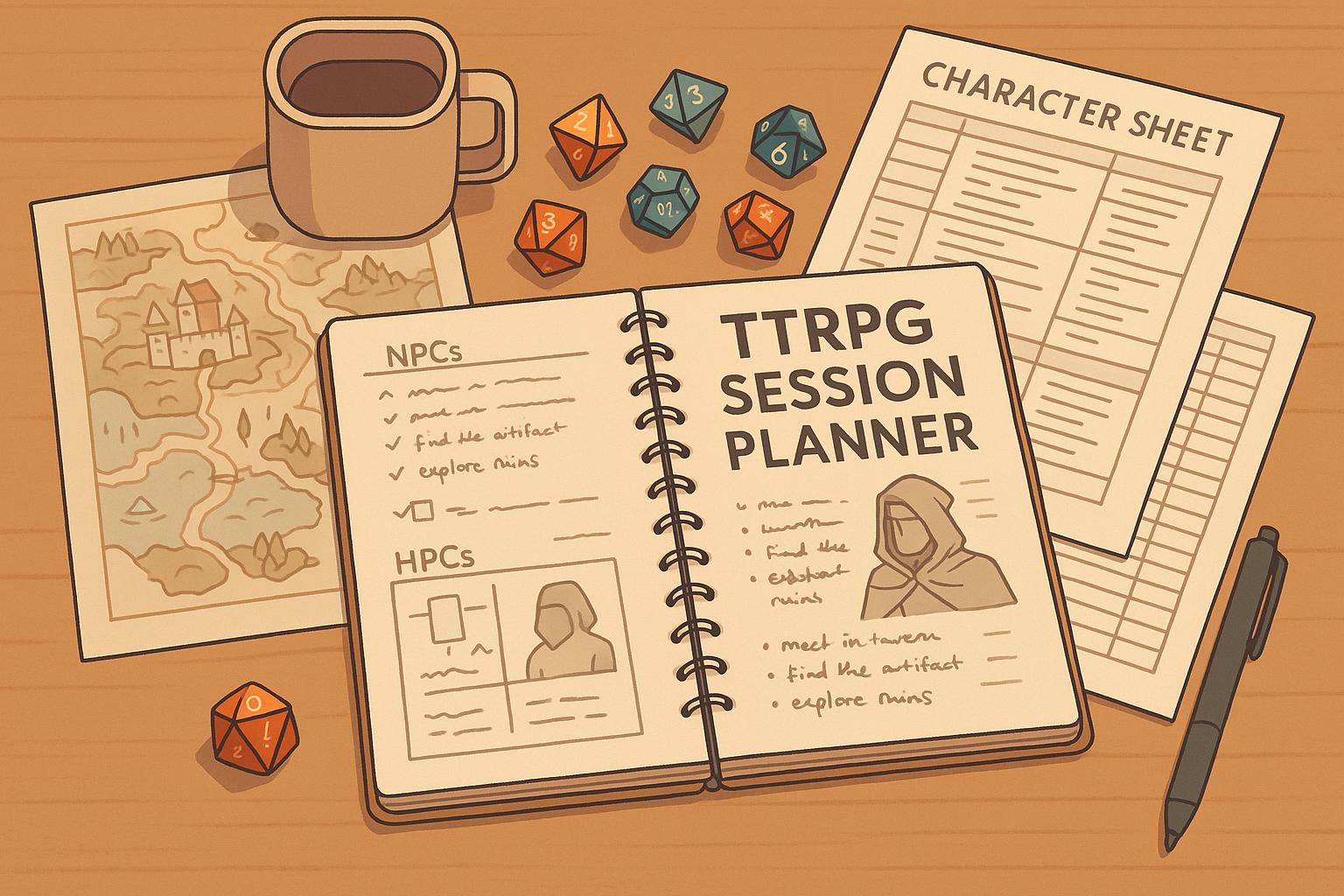NSR (New School Revolution) is a modern approach to tabletop role-playing games (TTRPGs) that simplifies gameplay by focusing on shared storytelling, quick character creation, and minimal rules. Unlike older RPG styles, NSR emphasizes flexibility and collaboration, making it accessible to both new and experienced players. Here's what sets NSR apart:
- Simplified Rules: Games are easy to learn, with short rulebooks and straightforward mechanics.
- Quick Start: Minimal setup and fast character creation let you jump into the action.
- Collaborative Play: Players and game masters (GMs) work together to shape the story.
- Player-Driven Narrative: Stories evolve based on player decisions rather than pre-written plots.
Popular NSR games like Into the Odd and Electric Bastionland highlight these ideas, offering fast-paced, player-focused experiences in unique settings. Whether you're new to TTRPGs or looking for a fresh approach, NSR makes it easy to dive in and enjoy storytelling without the complexity of traditional systems.
Core Principles and Design Philosophy of NSR
Rules-Light Systems and Player Freedom
At the heart of NSR games lies the belief that fewer rules open the door to greater creativity. Instead of overwhelming players with massive rulebooks crammed with detailed mechanics, NSR systems are often condensed into pamphlets or short booklets that can be read in less than an hour.
This minimalist approach allows players to focus on storytelling rather than flipping through charts or manuals. If an action fits the story - like using a rope to swing across a dangerous chasm - players can make a simple dice roll and move on. The emphasis is on keeping the narrative flowing, rather than bogging it down with complex mechanics. This approach also extends to character creation, where players can build fully fleshed-out characters in just a few minutes, making it easy to jump straight into the game.
NSR games don’t confine players to rigid character sheets. If an action makes sense within the story, players are encouraged to try it. This flexibility removes the barriers that can make traditional RPGs daunting, especially for newcomers who may not yet understand all the available mechanics or options.
Character creation mirrors this philosophy of simplicity. Instead of spending hours assigning skill points or debating between dozens of abilities, players can quickly create characters and start playing. This streamlined approach naturally supports NSR’s rulings-first mindset, ensuring the game stays flexible and accessible.
Rulings Over Rules and DIY Approach
The principle of "rulings over rules" is a cornerstone of NSR design. When players encounter a situation not explicitly covered by the rules, the game master (GM) makes a quick decision, and the story moves forward. This keeps the game flowing smoothly, ensuring the focus remains on the narrative rather than on debating mechanics.
This philosophy also encourages customization. NSR games are built to be hacked, modified, and tailored to fit the preferences of individual groups. Many NSR designers actively encourage players and GMs to tweak their games, viewing their creations as starting points rather than rigid, unchangeable systems.
The DIY mindset means you’re free to adjust or replace rules that don’t suit your group. Want to introduce a new magic system or create unique character options? NSR games provide a flexible framework that allows these changes without breaking the game. This adaptability makes NSR systems endlessly customizable while preserving their core simplicity.
In NSR games, the GM acts more as a storyteller than a strict rule enforcer. When players propose creative ideas, the GM’s role is to figure out how to make those ideas work within the story, rather than finding reasons to block them based on technicalities. This creates a more encouraging and collaborative atmosphere at the table.
Collaborative Play
Building on its streamlined mechanics and flexible rulings, NSR places a strong emphasis on collective storytelling. In these games, everyone at the table - players and GM alike - helps shape the narrative. Unlike traditional RPGs where the GM controls most of the story and players react to predetermined scenarios, NSR games encourage shared storytelling, giving players a direct hand in shaping the world and its events.
This collaborative spirit often extends to world-building during gameplay. For instance, if a player mentions their character’s hometown, the GM might ask them to describe what it’s like, rather than referring to a pre-written setting. Players can introduce story elements, suggest details for scenes, or even take control of minor non-player characters when it adds to the story. This shared control makes players feel more connected to the game world because they’ve helped create it.
Such collaboration requires trust between players and the GM, but it results in richer and more personal gaming experiences. Some NSR games even include mechanics that let players spend points or tokens to introduce favorable story elements. Others encourage players to narrate how their characters succeed or fail, giving them greater agency over the outcomes of their actions.
This philosophy also influences how challenges are approached in NSR games. Instead of relying solely on character abilities or dice rolls, players are encouraged to work together to find imaginative solutions. The emphasis shifts from individual optimization to group creativity, fostering a sense of teamwork and collaboration at every turn.
Want to Play NSR TTRPGs but Don't Know Where to Start?
How NSR Differs from Other RPG Styles
NSR sets itself apart with its streamlined mechanics, shared storytelling, and flexible narratives, offering a fresh take on role-playing games compared to more traditional approaches.
Game Mechanics: Keeping It Simple
At the heart of NSR's design is simplicity. Traditional RPGs, like Dungeons & Dragons 5th Edition or Pathfinder, often come with hefty rulebooks packed with intricate mechanics and detailed character progression systems. These games demand a significant time commitment to understand their spell lists, combat rules, and skill systems.
NSR flips this on its head. Its systems are designed to be quick to learn, often condensed into concise rule sets. Instead of having separate mechanics for every action - like climbing, stealth, or persuasion - NSR uses a single, adaptable system. This means less time spent flipping through rulebooks and more time immersed in the story.
Characters in NSR are also much simpler. Instead of juggling a long list of stats, skills, and abilities, players focus on just a few core attributes. This streamlined approach not only makes the game more accessible for newcomers but also keeps the pace lively. Character progression is equally straightforward, allowing development to happen naturally through gameplay rather than through meticulous planning.
The Game Master's Role: Guide, Not Dictator
Another key difference lies in how NSR redefines the role of the Game Master (GM). In traditional RPGs, the GM typically acts as the ultimate authority - responsible for knowing the rules inside out, controlling the world, and steering the story.
In NSR, the GM takes on a more collaborative role. Instead of rigidly planning every detail, they facilitate the narrative alongside the players. With fewer mechanical constraints, GMs can improvise and adapt more freely, creating a game that feels alive and responsive. This shift fosters a more dynamic and inclusive storytelling experience.
Storytelling: Letting Players Take the Lead
NSR's storytelling approach is another standout feature. Traditional RPGs often rely on pre-written modules with detailed plots and set encounters. While these can be immersive, they tend to limit player choices to what fits within the structured narrative.
NSR, on the other hand, thrives on player-driven storytelling. Sessions begin with simple premises and evolve based on the group's decisions and creativity. This means no two campaigns are alike - each story unfolds uniquely, shaped by the players' actions and ideas. The pacing also tends to be faster, focusing on key moments and scenes rather than exhaustive exploration of predetermined settings. Here, players aren't just participants; they're co-authors of the adventure.
Comparing RPG Styles
To better understand how NSR stands apart, here's a side-by-side comparison:
| Aspect | Traditional RPGs | OSR Games | NSR Games |
|---|---|---|---|
| Rules Complexity | Lengthy and detailed | Moderately detailed | Simple and concise |
| Learning Time | Time-intensive | Moderate | Quick and easy |
| GM Preparation | Extensive planning needed | Some prep with flexibility | Minimal prep, heavy on improv |
| Player Agency | Limited by structured modules | Focus on exploration | Collaborative storytelling |
| Character Creation | Long and detailed | Streamlined but detailed | Fast and straightforward |
| Conflict Resolution | Multiple specialized systems | Unified traditional mechanics | Single, flexible system |
| Story Structure | Pre-written modules | Sandbox-style exploration | Emergent and player-driven |
| Session Focus | Tactical combat, exploration | Dungeon crawling, resources | Narrative-driven moments |
This table highlights how NSR evolves beyond traditional RPG mechanics. While traditional games prioritize depth and OSR games emphasize exploration, NSR focuses on creative collaboration and fluid storytelling. It’s an ideal choice for players who want to dive straight into the action without getting bogged down by complex rules.
sbb-itb-b8b00a5
Popular NSR Games and Systems
The New School Revolution (NSR) has given rise to a collection of standout games that embody its core ideas. These games showcase how streamlined mechanics, collaborative storytelling, and player-driven narratives can create unforgettable gaming experiences - without the need for the intricate systems often found in traditional RPGs.
Into the Odd

Into the Odd, created by Chris McDowall, is one of the most iconic NSR games. It perfectly captures the movement's philosophy with its straightforward yet impactful design. The entire rulebook is just 48 pages long, but it delivers a complete experience that can entertain players for years.
The game simplifies everything with just three stats: Strength, Dexterity, and Willpower. Character creation is quick - roll for stats, grab some starting gear, and you're ready to go. There are no classes, levels, or complicated skill trees. Instead, characters are shaped by the equipment they carry and the decisions they make during the game.
Combat is fast and intense. Instead of rolling to hit, damage is automatic, making every encounter feel urgent and dangerous. Players must think strategically - deciding when to fight, when to flee, and how to use their resources wisely. This keeps the focus on creative problem-solving rather than optimizing stats.
The game's setting combines Victorian industrial themes with elements of weird science and exploration. Players venture into the Underground, a strange and perilous world filled with bizarre artifacts and creatures. The game encourages improvisation, with the GM building the world dynamically as the story unfolds.
Electric Bastionland

Electric Bastionland, also by Chris McDowall, builds on the foundation of Into the Odd while expanding its scope. Released in 2020, this game shifts to an urban setting filled with debt, bureaucracy, and eccentric technology, all while staying true to NSR principles.
Every character begins with a massive debt - typically between $10,000 and $50,000 - which drives the narrative. This debt isn’t just a background detail; it’s a central motivator, pushing characters into risky and unusual adventures. The game offers 100 "Failed Careers", which explain how characters ended up in debt. These range from washed-up street performers to disgraced accountants, adding depth and humor to the character creation process.
The mechanics stick to the same three stats but lean even more into solving problems creatively. Challenges often call for clever thinking, negotiation, or unconventional approaches rather than direct combat.
The setting, Bastion, is a sprawling city divided into 100 distinct districts. Each district comes with its own unique challenges and opportunities, encouraging players to think on their feet and engage in dynamic storytelling.
Other NSR Games
Beyond Into the Odd and Electric Bastionland, the NSR movement has inspired a variety of other innovative games:
- Cairn by Yochai Gal adapts NSR principles to a fantasy world. It features a classless system where characters grow through their equipment and experiences rather than predefined roles.
- Mausritter shrinks the NSR experience down to a world of sword-wielding mice. Its clever inventory system uses physical cards to represent items, making resource management tactile and fun.
- Troika! takes a surreal approach, throwing players into a multiverse where they might play as professional mourners, giant insect whisperers, or escaped lunatics. Its unique initiative system, using colored tokens, keeps encounters unpredictable and exciting.
- The Black Hack reimagines classic fantasy RPGs with stripped-down mechanics, focusing on the essentials of dungeon crawling and monster battles while keeping the nostalgic feel.
All these games share core NSR traits: minimal rules, emphasis on player creativity, and collaborative storytelling. They highlight how this philosophy can enhance any genre or setting, from industrial weirdness to whimsical mouse adventures.
If you're curious to dive deeper, the TTRPG Games Directory offers detailed breakdowns of these systems to help you find the perfect fit for your group. Whether you’re drawn to the eerie world of Electric Bastionland or the charming escapades of Mausritter, there’s an NSR game out there to match your style of play.
In the next section, we'll take a closer look at the tools, mechanics, and storytelling techniques that make NSR gameplay so distinctive.
Practical Tools and Tips for Beginners in NSR
Starting your journey into NSR gaming can be an exciting adventure, especially if you approach it with a hands-on, improvisational mindset. A good first step is gathering the basic supplies you’ll need for this style of gameplay.
Tips for Beginners to Start with NSR
Here are a few essential tips to help you ease into NSR gaming:
- Get your supplies ready. You’ll need a set of six-sided dice, index cards for jotting down ideas or NPC details, and some scratch paper for quick notes or sketching out encounters. These tools are essential for keeping up with the fast-paced and improvisational nature of NSR sessions.
- Start with simple scenarios. Choose straightforward setups that encourage spontaneous play and let you experiment with the style without feeling overwhelmed.
- Talk with your group. Set expectations and discuss how you’ll approach gameplay to create a collaborative and enjoyable experience for everyone.
Once you’ve got your tools and mindset ready, the next step is finding the right game to play.
Using TTRPG Games Directory to Find NSR Games
When you're ready to explore the world of NSR titles, the TTRPG Games Directory can be a fantastic resource. It offers everything you need to find a game that suits your preferences:
- Detailed game descriptions. Each listing provides an overview of the game's style and features, helping you understand what to expect.
- Filtering options. Search for games based on themes, mechanics, or complexity levels to find the perfect match for your group.
- A variety of genres. From classic titles to indie gems, the directory showcases a wide range of games that capture the creative spirit of NSR.
Whether you’re just starting out or looking to expand your collection, the TTRPG Games Directory makes it easy to discover games that align with your group’s style and interests.
Conclusion: Getting Started with New School Revolution
New School Revolution (NSR) is all about making tabletop role-playing games (TTRPGs) easy to dive into and fun for everyone. Forget about lugging around dense rulebooks - NSR uses simple mechanics that you can grasp in just minutes. This shift lets the focus stay where it belongs: on storytelling and creativity, not on deciphering rules.
What makes NSR stand out is how it flips the script on traditional RPGs. Instead of the game master holding most of the storytelling reins, NSR gives every player a voice in shaping the narrative. This collaborative dynamic leads to more engaging and memorable sessions, where everyone feels like an essential part of the adventure - whether you're a seasoned gamer or brand new to the scene.
With its rules-light approach, NSR encourages imaginative problem-solving and meaningful character interactions. By cutting down on time spent flipping through rulebooks or crunching numbers, it frees up more time for what really matters: exploring the world you and your group create together. This streamlined setup makes every session immersive and keeps the game flowing smoothly, perfectly capturing the spirit of NSR.
If you're curious about diving into this exciting movement, the TTRPG Games Directory is a great place to start. It offers a curated list of NSR titles that showcase the creativity and fast-paced fun this style of gaming brings. Whether you're drawn to the stripped-down brilliance of Into the Odd or the gritty, urban vibe of Electric Bastionland, there's something here to spark your imagination and get you rolling.
NSR’s open and inviting design makes it easy for anyone to jump into collaborative storytelling - no prior experience required.
FAQs
What makes NSR games easier for beginners than traditional RPGs?
NSR, short for New School Revolution, takes a fresh approach to tabletop role-playing games by stripping away overly complicated rules and lengthy setup processes. Instead, it focuses on simplicity, fast character creation, and encouraging players to unleash their creativity.
Unlike traditional RPGs that rely on dense rulebooks and hours of preparation, NSR systems are designed to be easy to pick up, making them an excellent choice for those new to the hobby. The spotlight here is on storytelling and letting players solve problems in their own unique ways, rather than getting bogged down by intricate mechanics. The goal? To create an experience that's fun, intuitive, and welcoming for everyone at the table.
How can players shape the story in an NSR game?
In NSR games, players take center stage in shaping the story, using their choices, actions, and imagination to drive the narrative forward. They work alongside the game master and fellow players, improvising dialogue, tackling challenges, and making decisions that directly impact the unfolding plot.
Character development is deeply intertwined with the story, as players evolve their characters through their in-game actions and decisions. This style of play highlights the importance of storytelling, inspiring players to think outside the box and actively contribute to the shared adventure.
Can NSR games work in different genres and settings, and how does this affect the gameplay experience?
Yes, NSR games can work seamlessly across various genres and settings, whether it's sci-fi, horror, post-apocalyptic worlds, or even modern-day scenarios. This versatility gives game designers and players the freedom to explore bold themes and craft stories that break away from the usual fantasy tropes.
By tweaking mechanics to suit the specific genre, NSR systems promote imaginative, player-driven storytelling. This flexibility keeps gameplay engaging and allows for deeply personalized experiences, ensuring every session feels distinct and exciting.


